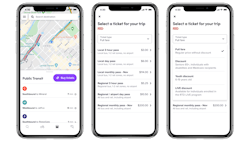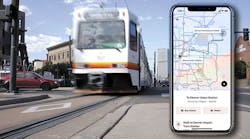Denver RTD, Lyft, Masabi launch mobile ticketing for transit customers
Masabi, Lyft and the Denver Regional Transportation District (RTD) have launched mobile ticketing for public transit, making customers in the Denver metro region the first to be able to purchase RTD fare through the Lyft app to ride the agency’s buses and trains.
The metro region has been an area of historic firsts for Lyft, including the launch of Lyft scooters in 2018. Lyft riders in the Denver metro region will be able to purchase RTD fares directly within the Lyft app as the update gradually rolls out in the coming weeks. With mobile ticketing, customers will have one more way — alongside Lyft rideshare, car rentals and scooters — to access reliable and efficient transportation in the Denver metro area.
RTD actively pursues ventures that integrate new mobility services with traditional public transportation. Amid a global pandemic, this launch provides customers with an additional payment option that is contactless and seamless. Further, RTD says it aligns with its vision of being the mobility integrator for the region, and it facilitates multimodal travel that closes the first- and last-mile gaps between transit and customers’ destinations. In Denver, 58 percent of Lyft customers have reported using a Lyft service to get to or from a transit station.
“During this unprecedented time when the transit industry and the world are living in a constant state of flux, ventures like this one allow RTD to meet the needs and expectations of our customers,” said RTD CEO and General Manager Debra A. Johnson. “Lyft customers have been able to open the app and see transit options available to them since last year. Today’s announcement now makes it possible for our customers to plan and pay for travel in one place, a fact that we know is of the highest value to those we serve.”
RTD tickets cost the same within the Lyft app as they do using any existing option. To purchase fares within the Lyft app, Denver customers can look for Transit on the Lyft app homescreen, where they can search and compare routes, purchase multiple fares using any credit or debit payment method currently enabled in Lyft, and save unused tickets for up to 45 days. When they’re ready to ride, they can view all available purchased tickets and activate a ticket with a single tap.
“Across our communities, we’ve seen how transportation access can unlock economic and social mobility,” said Patrick Quintana, general manager, Lyft Bikes & Scooters in Denver. “We’re excited to strengthen partnerships with local transportation agencies like RTD in support of our shared goal to reduce traffic, cut carbon emissions and make transportation more equitable.”
Transit ticketing has been enabled using Masabi’s Justride SDK, creating a seamless passenger experience combining transit and new mobility. Riders can also buy tickets through RTD’s Mobile Tickets app and other ticketing platforms. All of RTD’s in-app ticketing collaborations are made possible through a relationship with mobile ticketing platform provider Masabi.
“Travelers today require convenience, accessibility, control and visibility of their journeys from start to finish at an affordable price. By offering a single interface from which riders can plan and pay for journeys, new mobility partners such as Lyft are driving positive change in the way we move around cities,” said Brian Zanghi, CEO, Masabi. “Making public transit tickets available through Masabi’s Justride SDK in the Lyft app will help Denverites move seamlessly and safely around their city, and conveniently discover and access public transit services. We are delighted to have worked with RTD on yet another world first, and we’re confident cities will continue to look to Denver as an example of transit innovation.”
RTD previously collaborated with Lyft in 2018 for a “Ditch Your Car” effort, then in March 2019 to launch the company’s Transit feature in Denver. This feature shows customers nearby public transit routes, a walking overview and schedules within the Lyft app. App users are now able to identify nearby bus and rail connections in addition to Lyft vehicles and scooters. Lyft is using RTD’s publicly available transit data to provide schedule and real-time information about RTD’s transit services.




